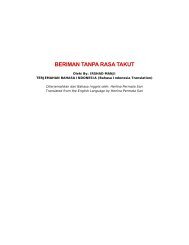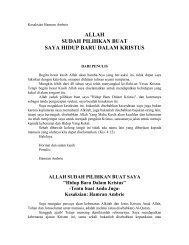A Critical Analysis of 'Real Islam'. Its People ... - Bukti dan Saksi
A Critical Analysis of 'Real Islam'. Its People ... - Bukti dan Saksi
A Critical Analysis of 'Real Islam'. Its People ... - Bukti dan Saksi
You also want an ePaper? Increase the reach of your titles
YUMPU automatically turns print PDFs into web optimized ePapers that Google loves.
perceived by the Muslim to be good for Islam or useful to bringing someone to "submission" to Allah,<br />
then pretty much any lie or act can be sanctioned. Indeed it is common practice for Muslims, especially<br />
leaders, to lie about any war or conflict involving Muslims vs. non-Muslims. Muslims reverting to<br />
deceptive tactics unashamedly do so with full knowledge they are adhering to Mohammed's words and<br />
example, so they operate without conscience believing they are absolved from any negative divine<br />
consequence. Even the Islamic God, Allah himself, is described in the Qur’an in the most literal<br />
translation from Arabic as; "the best <strong>of</strong> deceivers." [Surah 8:30] Another English translation goes; "They<br />
schemed - but God also schemed. God is most pr<strong>of</strong>ound in His machinations". So it appears that the deity<br />
Muslims worship is a God <strong>of</strong> deception, or at least to non-believers. This Sura relates that when nonbelievers<br />
deceived and schemed, planning evil against Muslims, that Allah also schemed, and his<br />
deceptions were superior. If you can wrap your mind around the concept <strong>of</strong> a perfect lie, you can<br />
understand better the Muslim God.<br />
In state-to-state relations Al-taqiyya political version is known as Kitman. Politically it means to<br />
project whatever image is necessary and advantageous in order to gain concessions from an adversary.<br />
The accepted principle <strong>of</strong> sanctioning lying for the cause <strong>of</strong> Islam bears grave implications in the sphere<br />
<strong>of</strong> international politics. The usual method <strong>of</strong> civilized diplomacy and negotiations might normally<br />
culminate in state treaties or other articles <strong>of</strong> agreement, but must be based on honesty, trust, and honored<br />
by both parties. But this principle <strong>of</strong> sanctioning lying for the cause <strong>of</strong> Islam implies that true lasting<br />
negotiated settlements may not be possible, as Muslims today seem to be taking ever greater liberty in<br />
expanding the parameters and scope <strong>of</strong> circumstances under which they are permitted to lie or use<br />
deceptive tactics. Knowing this, can non-Muslims expect anything more than deception and double-speak<br />
from Muslim leaders? Will nation-to-nation treaties with Islamic states yield the hoped for peace and<br />
benefits to the non-Muslim participants to such agreements? Unfortunately, when dealing with Muslims,<br />
one must keep in mind the implications <strong>of</strong> the principle <strong>of</strong> taqiyya, in that Muslims can communicate<br />
something with apparent sincerity, when in reality they may have in their hearts the opposite agenda. In<br />
AD 628 – Muhammad ongoing military conquests were not going well, and so for tactical purposes he<br />
signed a treaty with the Meccan Quarish tribe. (The Al-Hudaybiyya agreement between the Prophet and<br />
the Quarish was signed for a period <strong>of</strong> 10 years, which became, in Islamic tradition, the time limit for any<br />
agreement with non-Muslims). The Al-Hudaybiyya agreement was broken just 18 months later when<br />
Mohammed’s army advanced and conquered Mecca. Arafat’s signatures all had about the same value.<br />
Have you noticed that every time militant Arab Muslim groups find themselves in a losing position in<br />
conflicts they initiated, they immediately proclaim they are ready to suspend hostilities and begin<br />
negotiations? They suddenly become concerned with victims, saying "Peace" so <strong>of</strong>ten it becomes<br />
meaningless, yet Westerners fall for it every time. Arab Muslims have an insidious habit <strong>of</strong> negotiating<br />
falsely, a tactic that is all too easy to pass <strong>of</strong>f to ignorant Westerners longing for peace. Terrorists who<br />
rise up and kill (Saddam Hussein in his time, Yasser Arafat, Osama Bin Laden, the Janjaweed in Darfur,<br />
and now Iraqi terrorists Moqtada Sadr and al-Zarqawi) never stop or sue for peace when finding success.<br />
But when hit hard and causalities mount, they immediately plead for negotiations, only to start attacking<br />
again after resting and regrouping. In most prior wars involving nation states, Islamic countries howl for<br />
international intervention only when they start to lose battles they started. Nations need to start learning<br />
these rather transparent lessons <strong>of</strong> history. When they say they want to negotiate a fair ending to the<br />
conflict, it's a trick to call for a truce breather - called a "hudna". Perhaps it's forgivable for Western<br />
governments to make one or two mistakes in negotiations with Islamists, but when the same mistake is<br />
made time and again - then it is no longer mere error, its pure stupidity. Arafat frequently used this trick,<br />
relying upon the ignorance <strong>of</strong> the West. On May 10, 1994, 10 days after signing the First Gaza-Jericho<br />
agreement, Arafat spoke in English at a Johannesburg mosque explaining to his people why he was<br />
returning to the Peace table. He was unknowingly recorded to say; "This agreement, I am not considering<br />
it more than the agreement which had been signed between our prophet Muhammad and Quraysh..." To<br />
his own people in Arabic, Arafat had <strong>of</strong>ten repeated this illusion to the Hudaibiya Treaty. Although<br />
obscure to us, Palestinians understood perfectly well what he meant. Under the promise <strong>of</strong> peaceful<br />
'accommodation' or 'truce', Arafat had made and broken many agreements over time. When Arafat's<br />
terrorists were stalking around the streets <strong>of</strong> Amman, Jor<strong>dan</strong> in the 1960s, he made 26 separate





